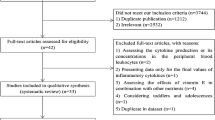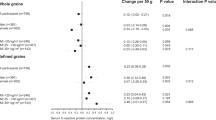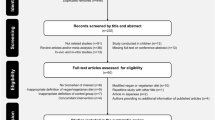Abstract
Objective: High-sensitivity C-reactive protein (CRP), a marker of systemic inflammation, is a powerful predictor of cardiovascular risk. We hypothesised that n-3 fatty acids reduce underlying inflammatory processes and consequently CRP concentrations in healthy middle-aged subjects.
Design: Placebo-controlled, double-blind study.
Subjects: A total of 43 men and 41 postmenopausal women aged 50–70 y. Before and after intervention, we measured serum CRP concentrations with an enzyme immunoassay.
Interventions: Capsules with either 3.5 g/day fish oil (1.5 g/day n-3 fatty acids) or placebo for 12 weeks.
Results: The median CRP change in the fish oil group did not significantly differ from that in the placebo group (0.01 vs −0.17 mg/l, P = 0.057).
Conclusion: The currently available data —including ours— do not support that beneficial effects on CRP are involved in a mechanism explaining the protective effect on heart disease risk of n-3 fatty acids as present in fish.
Sponsorship: Wageningen Centre for Food Sciences.
This is a preview of subscription content, access via your institution
Access options
Subscribe to this journal
Receive 12 print issues and online access
$259.00 per year
only $21.58 per issue
Buy this article
- Purchase on Springer Link
- Instant access to full article PDF
Prices may be subject to local taxes which are calculated during checkout

Similar content being viewed by others
References
Belluzzi A (2002): N-3 fatty acids for the treatment of inflammatory bowel diseases. Proc. Nutr. Soc. 61, 391–395.
Blok WL, Deslypere JP, Demacker PN, van der Ven-Jongekrijg J, Hectors MP, van der Meer JW & Katan MB (1997): Pro- and anti-inflammatory cytokines in healthy volunteers fed various doses of fish oil for 1 year. Eur. J. Clin. Invest. 27, 1003–1008.
Chan DC, Watts GF, Barrett PH, Beilin LJ & Mori TA (2002): Effect of atorvastatin and fish oil on plasma high-sensitivity C-reactive protein concentrations in individuals with visceral obesity. Clin. Chem. 48, 877–883.
Danesh J, Whincup P, Walker M, Lennon L, Thomson A, Appleby P, Gallimore JR & Pepys MB (2000): Low grade inflammation and coronary heart disease: prospective study and updated meta-analyses. BMJ. 321, 199–204.
de Maat MP, de Bart AC, Hennis BC, Meijer P, Havelaar AC, Mulder PG & Kluft C (1996): Interindividual and intraindividual variability in plasma fibrinogen, TPA antigen, PAI activity, and CRP in healthy, young volunteers and patients with angina pectoris. Arterioscler. Thromb. Vasc. Biol. 16, 1156–1162.
de-Maat MP, Pijl H, Kluft C & Princen HM (2000): Consumption of black and green tea had no effect on inflammation, haemostasis and endothelial markers in smoking healthy individuals. Eur. J. Clin. Nutr. 54, 757–763.
Endres S, Ghorbani R, Kelley VE, Georgilis K, Lonnemann G, van der Meer JW, Cannon JG, Rogers TS, Klempner MS & Weber PC (1989): The effect of dietary supplementation with n-3 polyunsaturated fatty acids on the synthesis of interleukin-1 and tumor necrosis factor by mononuclear cells. N. Engl. J. Med. 320, 265–271.
Endres S, Meydani SN, Ghorbani R, Schindler R & Dinarello CA (1993): Dietary supplementation with n-3 fatty acids suppresses interleukin-2 production and mononuclear cell proliferation. J. Leukoc. Biol. 54, 599–603.
Geelen A, Brouwer IA, Zock PL, Kors JA, Swenne CA, Katan MB & Schouten EG (2002): N-3) fatty acids do not affect electrocardiographic characteristics of healthy men and women. J. Nutr. 132, 3051–3054.
Geelen A, Zock PL, Swenne CA, Brouwer IA, Schouten EG & Katan MB (2003): Effect of n-3 fatty acids on heart rate variability and baroreflex sensitivity in middle-aged subjects. Am. Heart J. 146, e4.
Kew S, Banerjee T, Minihane AM, Finnegan YE, Muggli R, Albers R, Williams CM & Calder PC (2003): Lack of effect of foods enriched with plant- or marine-derived n-3 fatty acids on human immune function. Am. J. Clin. Nutr. 77, 1287–1295.
Kremer JM (2000): N-3 fatty acid supplements in rheumatoid arthritis. Am. J. Clin. Nutr. 71, 349S–351S.
Madsen T, Christensen JH, Blom M & Schmidt EB (2003): The effect of dietary n-3 fatty acids on serum concentrations of C-reactive protein: a dose–response study. Br. J. Nutr. 89, 517–522.
Pischon T, Hankinson SE, Hotamisligil GS, Rifai N, Willett WC & Rimm EB (2003): Habitual dietary intake of n-3 and n-6 fatty acids in relation to inflammatory markers among US men and women. Circulation 108, 155–160.
Ridker PM, Rifai N, Rose L, Buring JE & Cook NR (2002): Comparison of C-reactive protein and low-density lipoprotein cholesterol levels in the prediction of first cardiovascular events. N. Engl. J. Med. 347, 1557–1565.
Sierksma A, van-der-Gaag MS, Kluft C & Hendriks HF (2002): Moderate alcohol consumption reduces plasma C-reactive protein and fibrinogen levels; a randomized, diet-controlled intervention study. Eur. J. Clin. Nutr. 56, 1130–1136.
Yeh ET & Willerson JT (2003): Coming of age of C-reactive protein: using inflammation markers in cardiology. Circulation 107, 370–371.
Zock PL, Mensink RP, Harryvan J, de-Vries JH & Katan MB (1997): Fatty acids in serum cholesteryl esters as quantitative biomarkers of dietary intake in humans. Am. J. Epidemiol. 145, 1114–1122.
Acknowledgements
This study was funded by the Wageningen Centre for Food Sciences, an alliance of major Dutch food industries, Maastricht University, TNO Nutrition and Food Research, and Wageningen University and Research Centre, with financial support by the Dutch government.
Author information
Authors and Affiliations
Contributions
Guarantor: A Geelen.
Contributors: All authors contributed to the development of the protocol and were involved in the writing of the manuscript. AG analysed the data and wrote the manuscript.
Corresponding author
Rights and permissions
About this article
Cite this article
Geelen, A., Brouwer, I., Schouten, E. et al. Intake of n-3 fatty acids from fish does not lower serum concentrations of C-reactive protein in healthy subjects. Eur J Clin Nutr 58, 1440–1442 (2004). https://doi.org/10.1038/sj.ejcn.1601986
Received:
Revised:
Accepted:
Published:
Issue Date:
DOI: https://doi.org/10.1038/sj.ejcn.1601986
Keywords
This article is cited by
-
Review of Cardiometabolic Effects of Prescription Omega-3 Fatty Acids
Current Atherosclerosis Reports (2017)
-
Effects of Iron Supplementation With and Without Docosahexaenoic Acid on the Cardiovascular Disease Risk Based on Paraoxonase-1, hs-CRP, and ApoB/ApoA-I Ratio in Women with Iron Deficiency Anemia
Biological Trace Element Research (2016)
-
Association of serum n-3 polyunsaturated fatty acids with C-reactive protein in men
European Journal of Clinical Nutrition (2012)
-
Effect of marine n-3 fatty acids on circulating inflammatory markers in healthy subjects and subjects with cardiovascular risk factors
Inflammation Research (2011)
-
Metabolic Effects of Krill Oil are Essentially Similar to Those of Fish Oil but at Lower Dose of EPA and DHA, in Healthy Volunteers
Lipids (2011)



